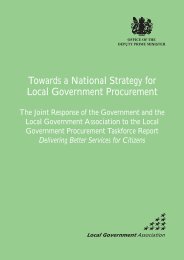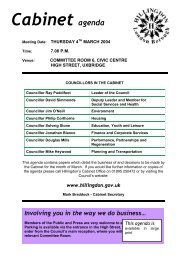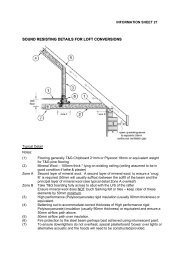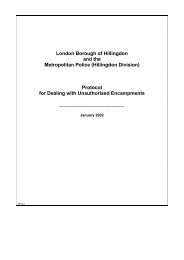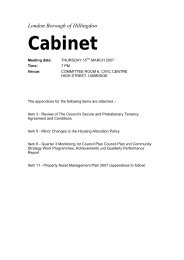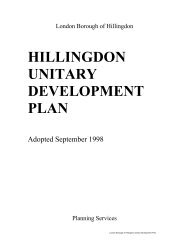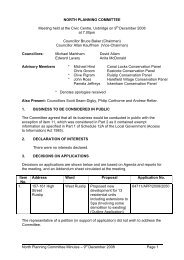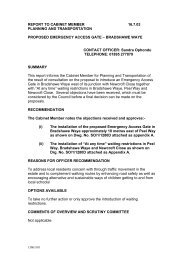Reluctant Gangsters - London Borough of Hillingdon
Reluctant Gangsters - London Borough of Hillingdon
Reluctant Gangsters - London Borough of Hillingdon
Create successful ePaper yourself
Turn your PDF publications into a flip-book with our unique Google optimized e-Paper software.
me because <strong>of</strong> something I was supposed to have said when I<br />
was inside. You have to fight otherwise you’d look scared and<br />
it would get worse and they would think they could do what<br />
they like with you. They have to know that it won’t be easy.<br />
(KI.48)<br />
Respect matters because to be disrespected is to be ‘fair game’ for<br />
anyone who wants to make a name for themselves and, as we<br />
suggest below, this is virtually everybody involved with gangs. And<br />
this is also why, as Bill Sanders (2006) notes, that in certain<br />
neighbourhoods, being ‘mugged’ is <strong>of</strong>ten a prelude to a career <strong>of</strong><br />
street crime, as young people endeavour to rebuild respect in their<br />
social mileau in the wake <strong>of</strong> an attack. However, being respected in<br />
this way has a particularly acute downside:<br />
Respect? Well, it’s fear isn’t it. You want to be feared, but<br />
nobody is untouchable, there is always someone to come after<br />
you with a blade or something. There’s no way out.<br />
(KI.26)<br />
Intra-gang Conflict<br />
Many gang members appear to have a virtually obsessional<br />
preoccupation with status and respect. This is institutionalised into<br />
gang culture in the form <strong>of</strong> an elaborate non-verbal and clothingbased<br />
etiquette, the breach <strong>of</strong> which ‘can get you killed’<br />
(KI.07,24,26). Gang members also tend to be highly individualistic<br />
and enjoy a very low level <strong>of</strong> mutual trust. When we add to this the<br />
fact that many gang members are, knife and gun-carrying crackcocaine<br />
users, and hence subject to the ‘crash’, the comedown from<br />
crack, characterised by anxiety, depression, irritability, extreme<br />
fatigue and paranoia, it is not surprising that interpersonal<br />
relationships within the gang are <strong>of</strong>ten somewhat fraught<br />
(KI.06,07,13,24). These relationships are put under even greater<br />
strain when gang members assault or rob friends or relations or,<br />
indeed, one another; a not infrequent occurrence (Palmer & Pitts,<br />
2006). And this accounts for the fluidity and volatility <strong>of</strong> gangs, as<br />
evidenced by the recent emergence <strong>of</strong> Drive.<br />
Inter-gang ‘Beefs’<br />
Drive, a fast-growing gang, came together around a friendship<br />
group <strong>of</strong> former Warwick School students who ‘hang-out’ around<br />
Atlee Terrace (KI.07,28,47). Drive comprises members, many <strong>of</strong><br />
whom have defected from other gangs as a result <strong>of</strong> being cheated,<br />
robbed, abused or disrespected and, as such, the emergence <strong>of</strong><br />
Drive bears eloquent testimony to the forces making for instability<br />
in gangland, and the sometimes random and chaotic nature <strong>of</strong> gang<br />
affiliation.<br />
47



